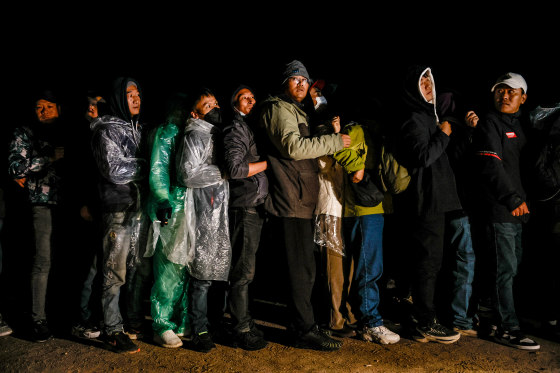
President-elect Donald Trump’s transition team is considering ending two Biden administration programs that have allowed more than 1.3 million immigrants to enter the U.S. legally, making those who entered but have not yet received asylum eligible for deportation, two sources familiar with the plans told NBC News.
The exact number of people who could face deportation after arriving in the U.S. legally is not known, but it is estimated to be in the hundreds of thousands.
Trump’s plan to end the two Biden programs comes as the president-elect’s promised plan to carry out mass deportations is taking clearer shape. Trump’s transition team is considering plans designed to maximize the scope of the deportations and prioritize certain immigrants as among the first to be forced to leave.
While those who entered under the programs may be eligible for deportation, the first people likely to be targeted are those considered to be threats, possibly including Chinese men who are deemed to be of military age living illegally in the United States, the two sources and a third source familiar with the plan told NBC News. This group would also include convicted criminals who are in the U.S. illegally and those with final orders of deportation, the officials said.
Migrants who arrived in the U.S. legally under the two Biden administration programs — CBP One and the Cuba, Haiti, Nicaragua, Venezuela (CHNV) parole program — may be immune from deportation if they have already been granted asylum or are on the path toward it, or have another legal status to stay in the United States.
If not, they may be deported as part of Trump’s plan to dramatically increase the number of migrant deportations.
The sources cautioned, though, that they may not be considered top priorities for deportation after Trump takes office, but could still be deported eventually.
The programs have been a critical part of Biden’s strategy to increase the number of legal pathways for migrants to enter the U.S. while disincentivizing illegal border crossings.
Since the migrants entered the U.S. legally, any attempt by Trump to deport them will likely be challenged in court by various groups.
A spokesperson for the Trump campaign did not respond to a request for comment.
Legal battles expected
Immigration advocates have applauded the Biden administration programs and will likely ask judges to block any deportation plan, just as they asked judges during Trump’s first term to stop his plan to end the DACA program for immigrants brought to the U.S. as children.
The Supreme Court struck down the Trump administration’s attempt to end DACA in 2020, but that was before the court switched to a conservative supermajority.
One immigration advocate, speaking on the condition of anonymity because they did not want to discuss potential litigation, said the new administration should expect legal challenges.
“If [Trump] cancels the [CHNV] parole program, what does that mean for people who are already here to revoke their parole? We expect that to be legally difficult,” the advocate said.
Over 531,0000 nationals of Cuba, Haiti, Nicaragua and Venezuela have entered the U.S. through the CHNV parole program, which was created to allow migrants from those countries to apply for entry from their home countries with the help of a U.S.-based sponsor.
Over 852,000 migrants have entered through CBP One, a cellphone application program for migrants who have already left their home countries and are waiting in northern Mexico. Through the app, they can apply for an appointment to be considered for asylum, though they do not necessarily qualify.
Two officials said targeting migrants who have applied to enter the country through these programs will be easier than finding others living in the U.S. because they had to provide addresses where they planned to live and other information to apply.
Who will be targeted for deportation?
Chinese nationals deemed of military age and considered to be illegally living in the U.S. will be among those targeted first because they may pose a national security risk, sources close to the Trump campaign said.
In recent years, the number of Chinese nationals crossing into the U.S. has soared. Prior to 2021, the number of Chinese nationals crossing illegally averaged less than 1,000 per year.
The number of undocumented Chinese nationals crossing both northern and southern borders into the U.S. nearly tripled from just over 27,000 in fiscal year 2022 to over 78,000 in fiscal year 2024.
Of those who crossed in 2024, over 65,000 were single adults, per Customs and Border Protection data. It is not clear how many of them were male.
Immigration and Customs Enforcement has had a difficult time deporting migrants from China, as well as Nicaragua, Venezuela, Haiti and Cuba, because those countries often refuse to take back their nationals.
Two sources familiar with the incoming administration’s plans said the Trump administration may consider sending migrants to third countries if their home country refuses to accept them. Trump used a similar policy at the end of his first term when the U.S. deported migrants from third countries to Guatemala.
Note: Thank you for visiting our website! We strive to keep you informed with the latest updates based on expected timelines, although please note that we are not affiliated with any official bodies. Our team is committed to ensuring accuracy and transparency in our reporting, verifying all information before publication. We aim to bring you reliable news, and if you have any questions or concerns about our content, feel free to reach out to us via email. We appreciate your trust and support!
